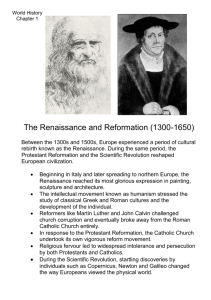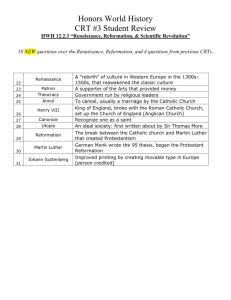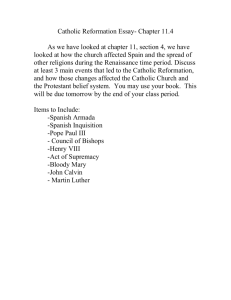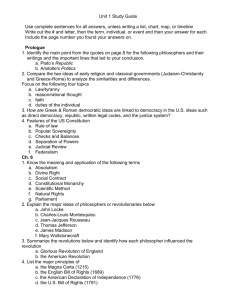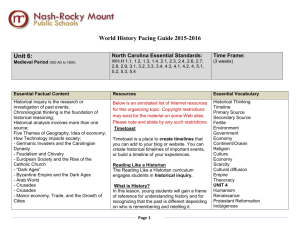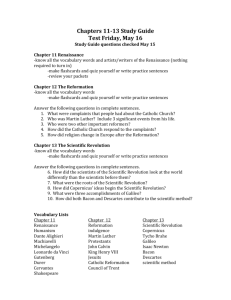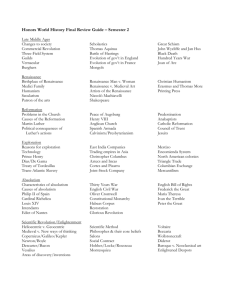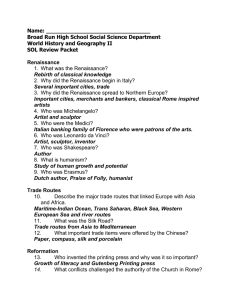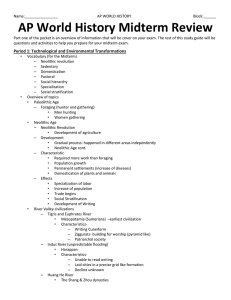Vocabulary List #6
advertisement
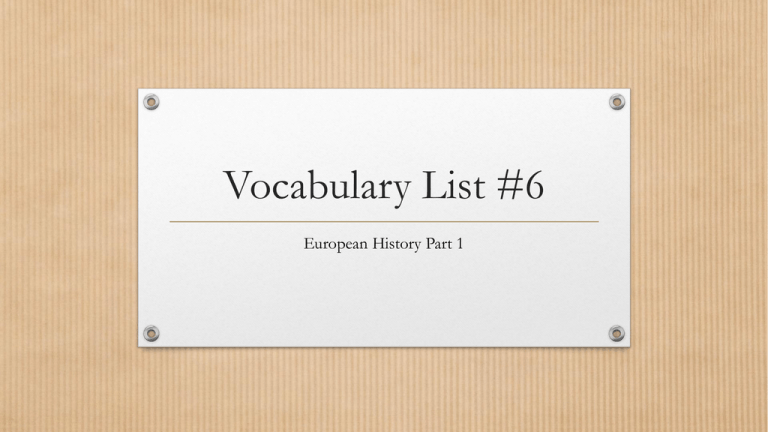
Vocabulary List #6 European History Part 1 Renaissance • A time of a renewed interest in art and learning in Europe; "rebirth“. Inspired by Ancient Greece and Roman ideas of architecture, painting • Artists were Michelangelo and DaVinci. Humanism • The study of secular, or nonreligious, subjects such as history and philosophy. • Think about thinking…Plato, Socrates, Albert Einstein, no religion involved. Perspective • A technique that allows artists to portray a threedimensional space on a flat surface Reformation • Religious movement in which calls for reform led to the emergence of nonCatholic, or Protestant, churches • Martin Luther, a German monk, posted 95 theses on a church door. His writing challenged some portions of Roman Catholic doctrine and a number of specific practices. Catholic Reformation • Changes made by the Catholic Church to keep Catholicism strong; response to the Reformation. • A response to the Protestant Reformation, Catholics reaffirmation of the doctrine and structure of the Catholic Church. Cartography • The science of making accurate maps and globes • From Latin: Carte (map or chart) Graphy (drawing, writing, recording) Caravel • Small triangular-sailed oceangoing ships. • Designed for speed, maneuverability, and safety. Early European explorers sailed on caravels. • Used by Portuguese and Spanish for ocean travel. Plantation • Large commercial farm. • Prince Henry developed sugar plantations Northwest Passage • Hypothetical North American passage between the Atlantic and Pacific Oceans. • One of the world’s most treacherous sea challenges, the route is located 500 miles north of the Arctic Circle and less than 1,200 miles from the North Pole. It consists of a deep channels, a hazardous voyage through a stream of about 50,000 giant icebergs, and a polar ice cap presses down on Alaska’s shallow north coast much of the year. Triangular Trade • Three-staged trade pattern that carried goods and enslaved people among Europe, Africa, and the Americas • The “first leg” was transporting manufactured good from Europe to Africa. The “middle passage” brought enslaved Africans from Africa to the Americas. The final stage brought raw materials from the Americas back to Europe. Absolutism • Centralized and unlimited government power • The European monarchies, especially those of France, Spain, and Russia, between the fifteenth and eighteenth centuries provide perhaps the clearest examples of absolute rule, although forms of absolutism have existed in most parts of the world. It was not until the end of the eighteenth century that the prevalence of absolute rule in Europe began to wane. Scientific Revolution • A series of major advances in science during the 1500s and 1600s • Compound Microscope, Telescopes, Elliptical orbits, Sunspots, Ocean Tides, Light Spectrum, Speed of Light, Barometer, Laws of Gravity, Calculus • Galileo, Isaac Newton, Copernicus Enlightenment • A period during the 1600s and 1700s when scholars studied culture and society by applying reason and natural law. • a European intellectual movement of the emphasizing reason and individualism rather than tradition. English Bill of Rights • An act passed in 1689 that limited the power of the English monarch and increased Parliament's power. • The Parliament of England passed the Bill of Rights on December 16, 1689. The Bill: • • • • Created separation of powers Limited powers of the king and queen Enhanced democratic election Bolstered freedom of speech French Revolution • A political movement that removed the French king from power and formed a republic • The French Revolution was a period of far-reaching social and political upheaval in France that lasted from 1789 until 1799, and was partially carried forward by Napoleon. The Revolution overthrew the monarchy, established a republic, and experienced violent periods of political turmoil. Industrial Revolution • A time in which new technologies transformed manufacturing and changed society forever. • Some inventions included: Steam engine, Water frame spinning machine, process creating wrought iron, steel making machine, power loom. Doctrine • teaching or principle • a belief or set of beliefs held and taught by a church, political party, or other group • Catholics and Protestants felt certain that their own beliefs were the only correct doctrine. Finance • to raise or provide funds • Christopher Columbus promised to reach Asia by sailing Westward across the Atlantic. Spain’s rulers agreed to finance his voyage. Columbian Exchange • A period of cultural and biological exchange between the American & Afro-Eurasian hemispheres following Columbus's 1492 voyage. Items included animals, plants, culture, human populations (including slaves), communicable disease, technology and ideas. Consent • agreement or approval • During Enlightenment, many people wrote about society and government. Some believed people were born with right to life, liberty and property, and government depended on people’s consent.
